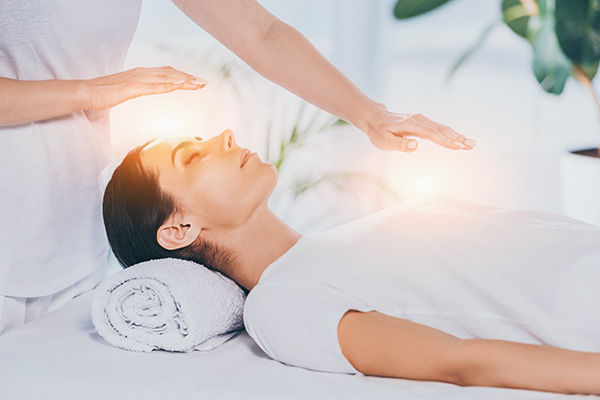 Reiki offers a variety of potential benefits for your physical and mental health. Reiki teaches that when our life force is high, we feel happy, radiant, and energetic, and when our life force is low, we feel sick, exhausted, and stressed.
Reiki offers a variety of potential benefits for your physical and mental health. Reiki teaches that when our life force is high, we feel happy, radiant, and energetic, and when our life force is low, we feel sick, exhausted, and stressed.
Reiki is a type of energy therapy in which the practitioner uses his or her hands to transfer life force energy to the recipient.This universal energy or life force flows through all living things and is called arrive Japanese.This concept is similar to gas (or gas) in Chinese culture and prana in Indian culture.
Qualified Reiki therapists are trained to channel healing energy to balance your life force energy flow and restore you to a state of harmony and vitality.
Reiki has become increasingly popular in recent years. People once viewed with skepticism by mainstream medicine are increasingly open to complementary therapies, and Reiki is seen as a gentle and relaxing treatment.
In today’s fast-paced world, stress is a major issue. Reiki’s reputation for promoting relaxation and reducing stress makes it attractive to many people. Celebrities such as Angelina Jolie, Nicole Kidman, Sandra Bullock and Gwyneth Paltrow, as well as all mothers, have spoken openly about their use of Reiki, giving it a touch of glamor and society recognized.
Some hospitals and medical centers even offer Reiki alongside traditional medicine as an adjunct treatment for their patients. Although conclusive scientific evidence is lacking, research into the potential benefits of Reiki is ongoing, adding to its credibility.
In Reiki, healing is not about removing physical illness. This is a process of connecting with the true self. The true self is complete, satisfied, and happy~ Bronwen Stein
Overall, Reiki’s popularity may be due to a combination of factors: its focus on relaxation, the growing acceptance of alternative therapies, and its integration into some health care settings.
Benefits of Reiki Healing
Some reasons why you should consider Reiki classes include:
relieve pressure: One of the main benefits of Reiki is its ability to reduce stress and promote relaxation. This is accomplished by balancing the body’s energy centers, which helps relieve tension and promote a state of calm and inner peace.
Emotional healing: Reiki can help manage emotions and help heal emotional trauma. It is often used as a complementary therapy to treat anxiety, depression, and emotional trauma, providing a feeling of calm and emotional stability.
pain management: Some people turn to Reiki to relieve and manage pain. While Reiki does not replace traditional medical treatment, it can serve as a supportive therapy to help relieve pain and discomfort caused by a variety of diseases and conditions.
improve sleeping: The relaxing effects of Reiki help improve sleep. People who suffer from insomnia or irregular sleep patterns often find that Reiki treatments help achieve more restful and deeper sleep.
Physiotherapy: Reiki accelerates the body’s ability to heal itself. It can be used in conjunction with other medical treatments to aid recovery from illness, surgery and injury by enhancing the body’s natural healing process.
Complementary therapies: Reiki is non-invasive and considered safe. It can complement other forms of therapy and medication without interfering with them. Many people find it beneficial as part of a broader approach to health and wellness.
Energy Purification: Reiki is an excellent practice for enhancing energetic health and is often used as an energy cleansing technique to release negative energy, toxic patterns and energy blockages. Reiki aims to restore balance to the body’s energy systems. It brings an overall sense of well-being by harmonizing the mind, body and spirit.
Reiki is love, love is wholeness, wholeness is balance, balance is happiness, and happiness is freedom from disease~ Frank Aljava Pate
Working with a Reiki healer can become an important part of your spiritual practice and personal well-being. Here’s what we can expect:
Find a practitioner
Find a certified, reputable Reiki therapist with good reviews. You can seek advice from friends, family, or your doctor, or search online directories such as the International Association of Reiki Professionals or the International Reiki Organization. It is important to choose a qualified and ethical practitioner who respects your boundaries and privacy.
It is also important to choose your Reiki therapist wisely so that you feel connected and comfortable with him or her to get the maximum benefit from your treatment. Therefore, you need to find someone who is not only well-trained and experienced, but also has the compassion, empathy, and understanding to listen to your problems, health concerns, and goals.
Prepare for your meeting
Think about what you want to get out of the meeting. Is it stress relief, pain management, or overall well-being? Having a clear intention can help direct the reiki energy. Discuss your goals and expectations with your doctor. Be open and honest about any health concerns or questions you may have.
Drink plenty of water in the days leading up to training. This helps energy flow and helps release toxins. Avoid overeating, caffeine, alcohol, or recreational drugs before treatment. These substances can interfere with relaxation and the effectiveness of Reiki.
Wear loose, comfortable clothing that won’t restrict your movement. Use the restroom in advance to avoid interruptions during the meeting. If possible, take some time to meditate or relax before your appointment.
what to expect
The environment may be soothing and welcoming, with soft lighting and relaxing music. You can lie comfortably on a massage table or sit in a chair with your clothes on. Using different hand shapes, your Reiki therapist will gently place his or her hands on or over certain areas of your body, holding each position for a few minutes. No massage or manipulation.
It’s important to note that different people experience Reiki differently. Some people report feeling warm, tingling, or vibrating, while others may experience a cooling or deeply relaxing sensation. Some people may not feel anything at all and may even fall asleep. It all works perfectly! However, it is expected that many people will experience a release of emotions during a Reiki treatment.
Reiki sessions can last from 30 to 90 minutes, depending on your individual needs. After your Reiki session, you will need to take some time to adjust to the energetic shifts that are taking place. It is also recommended that you drink plenty of water after training and allow yourself time to relax.
Discuss your experience with a practitioner and ask any questions you may have. They may recommend additional classes or other complementary practices to support your health.
Reiki will guide you. Let the Reiki energy guide you. Don’t try to direct it, let the energy flow freely through you~ Takada Hayoro
Reiki distance healing
Reiki distance healing, also known as distance or distance healing, is a practice in Reiki in which the practitioner sends healing energy across time and space to an absent recipient. It is based on the fact that energy is not limited by physical boundaries and can be transmitted over long distances, just like radio waves or Internet signals.
You don’t need to do anything special to have a distance reiki session, but it’s always a good idea to schedule a specific time and day with your therapist so you can be prepared and maybe lie down to make it easier Accept the healing energy that is coming your way.
Reiki and healthcare
It is important to understand that Reiki is not a substitute for traditional medical care and is in no way a substitute for professional medical advice or treatment. If you have any health concerns, always consult your doctor.
Research has demonstrated the many benefits of Reiki, particularly in terms of relaxation and stress reduction, but the scientific evidence for physical therapy itself is inconclusive. Therefore, Reiki, like many other alternative and complementary therapies, is not entirely based on scientific evidence, so some people believe it does not work. All I can say is, if you find it works for you, then it works for you – and that’s all that matters.
While the results of Reiki treatments vary from person to person, most people report positive experiences and benefits from Reiki treatments. It’s important to approach Reiki with an open mind and see it as part of a holistic approach to health and wellness, rather than as a stand-alone therapy for a disease. As with any complementary therapy, it is wise to consult a healthcare professional before starting any new treatment.
It’s also important to know that you don’t have to have a specific disease or condition to benefit from Reiki, but rather think of it more as a maintenance program to keep you in good shape emotionally, physically, and spiritually.
|
Lucinda is a trained intuitive and empath living in a beautiful village in North Yorkshire, England. She has the rare gift of understanding her clients’ personal pain and has been through many challenges herself, which only makes her stronger! Helping those in need is both her mission and her joy. Whenever she needs a little help herself, her guidance is always there to assist her development and provide clear explanations to her clients. Predictions have always been an important tool that she can rely on to accurately predict events, but Lucinda also uses her expertise in dream interpretation, numerology, angel cards, law of attraction, and life coaching to provide comprehensive, detailed answers to any question solution. As a member of AMORC and Beyond Freedom Evolution, she provides inspiration, education and personal support for spiritual development. If you want answers or want your desires fulfilled, you can find Lucinda at PsychicAccess.com. |


2 Comments
Your point of view caught my eye and was very interesting. Thanks. I have a question for you.
Can you be more specific about the content of your article? After reading it, I still have some doubts. Hope you can help me.